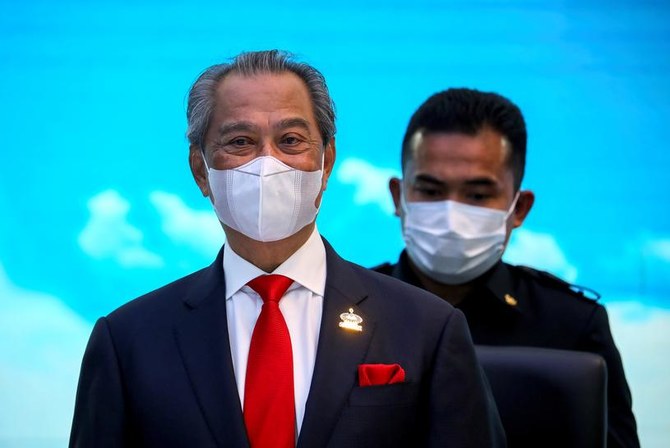KUALA LUMPUR: Prime Minister Muhyiddin Yassin has deferred a key parliamentary session set for Monday amid intense pressure to step down from office.
This comes a day after hundreds of Malaysians took to the streets to protest against his mismanagement of the COVID-19 outbreak, which has worsened since January.
More than 500 black-clad Malaysians participated in the “Keluar dan #LAWAN” protest in Kuala Lumpur on Saturday, defying a ban on mass gatherings under COVID-19 curbs, with experts saying that Muhyiddin was “fighting for his political life.”
“This guy (Muhyiddin) is basically fighting for his political life, and we will get a clearer picture of his fate in the coming week, but he does have one advantage — the prime minister’s office,” said Prof. James Chin, Tasmania University professor of Asian Studies and inaugural director of the Asia Institute.
He told Arab News that while the protests were initially meant to “express disdain against the government and its incompetence in dealing with the pandemic,” new developments in parliament “had renewed the drive.”
Muhyiddin’s decision to postpone parliament, citing COVID-19 infections among staff, allows him to avoid a no-confidence vote amid growing calls to resign.
A notification issued to lawmakers on Saturday said that the session would be held “at a later date” after 11 staff and others tested positive on Thursday.
Parliament reopened last Monday following a months-long suspension during a COVID-19-related state of emergency that ends on Sunday.
The state of emergency allowed Muhyiddin to rule by ordinance without legislative approval until Aug. 1, but it has fueled public anger after a significant spike in infections since January.
On Sunday, Malaysia reported 17,150 new cases while the total number of infections since the pandemic rose to 1.1 million, with more than 8,800 deaths. Nearly 20 percent of the population has been fully vaccinated.
This is the third time that parliament has been suspended due to the coronavirus.
It was shut down for several months after Muhyiddin assumed office in March 2020 and since January this year, after the king approved the premier’s plan to impose a state of emergency to curb the COVID-19 outbreak.
However, Malaysia’s political crisis deepened on Thursday after its monarch Sultan Abdullah Ahmad Shah rebuked Law Minister Takiyuddin Hassan over remarks that emergency laws had been revoked as of July 21, ahead of the Aug 1 expiration, “which make the parliamentary debate on the matter unnecessary.”
Sultan Abdullah said that he had yet to give his consent on the cancelation of laws imposed without legislative approvals throughout Malaysia’s seven-month emergency but told the government to debate them in Parliament — which may lead to a vote that could test the prime minister’s majority.
The palace, in a statement, said the rushed move to cancel the laws and the conflicting announcement “undermines the functions and powers of His Majesty as the reigning Head of State.”
There was no immediate comment from the government on Sunday.
However, the opposition, which has filed a no-confidence motion against PM Muhyiddin, said that the delay in convening parliament was an “excuse” for him to stay in power.
“Many parties feel it’s not because of COVID-19. This political crisis must be resolved immediately. This constitutional crisis must be addressed,” Ahmad Maslan, a lawmaker in the biggest party in Muhyiddin’s alliance that has backed calls for the premier to quit, said in a Twitter post.
The two-hour protest on Saturday, organized by the Sekretariat Solidariti Rakyat (SSR), saw Malaysians occupy the main street opposite the historical Merdeka Square and follows a similar demonstration outside the parliament building in April.
“It was an attack on the government for their failure in dealing with the pandemic, but now the prime minister has been seen as being disloyal to the king,” Chin said.
Police told local media on Sunday that protesters would be called in for questioning as they had violated a ban on gatherings.
Federal Police Chief Acryl Sani Abdullah Sani said that probes were launched under Act 342, or The Prevention and Control of Infectious Diseases Act 1988.
“We have identified 29 individuals who will be called in to assist with investigations, and more will be identified from videos and photos that have been uploaded,” Acryl said.
Others worry that the demonstrations could trigger a spike in infections.
“Although the protesters had taken efforts to enforce safety procedures, risks were still present,” Dr. Lim Chee Han, a senior researcher from Third World Network and public health expert, told Arab News.
He added that “even if 95 percent of the protesters complied with safe practices, there was a 5 percent risk of those who could possibly spread the virus.”
“Of course, whenever there are people grouping in great numbers that increases the risk of disease transmission, given right now the local transmission is still at the height, so it cannot rule out any spread of the virus in the transmission chain,” Lim said.




























